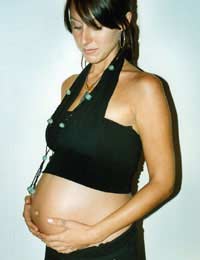When Can You Expect to Feel Your Unborn Baby Moving?

Pregnancy is an exciting time full of new experiences, but one of the best moments has to be when you first feel a tiny kick or movement in your womb. But when can you expect to first feel your unborn baby moving around?
When you first become aware of your baby moving around inside you, it’s a wonderful – if not slightly surreal – experience. For many first time mums, it makes pregnancy seem more ‘real’ and brings with it the certainty that you really do have a tiny baby inside your womb.
Babies can be quite active in the womb from as early as 12 weeks of age, but it’s generally not apparent to mums. Some women are able to associate the light, fluttering, wind-type symptoms they experience from about 16 weeks onwards as the first tiny kicks of a baby, but it’s perfectly normal not to fully realise this is what it is.
This is known as ‘quickening’ and may be easier to recognise when you’ve been pregnant before.
The First Real Kick From Your Baby
It’s not until about the 18 to 22 week stage that your baby is able to move around more and is much more likely to produce their first proper kick – or the first kick that feels ‘proper’ to you.Your baby won’t move all the time, and they’ll be some days when you may not notice any movement at all. But from 20 weeks onwards they’ll be gradually getting stronger and their activity can increase. As well as small kicks, you may be able to feel it as your baby moves around in the womb.
Between 24 and 28 weeks, you may even begin to feel it as your baby experiences their first hiccups! It may not be clear what this is at first, but it feels a bit like a sudden jerking movement in your tummy.
Your baby’s movements naturally reach a bit of a plateau by around 32 weeks gestation. This is simply because by then they’ll have grown a lot and have far less room in which to move around in the womb.
However, at around 36 weeks, you may well begin to notice more sharp, painful or jabbing sensations. These will be from both your baby’s arms and legs, and can be quite painful if they kick or thump you in the ribs. In the final run-up to the birth, movement may be less prominent, which is perfectly normal.
What If You Don’t Feel Your Baby Move?
If you can’t feel your baby moving, don’t panic. Sometimes the placenta can be located in the front of your baby – which is medically termed an anterior placenta. This can have a cushioning effect, so that you don’t feel your baby moving so much or at all.If you’re normally aware of movements, but think it’s slowed down, then it may simply be because your baby is tired. They can be influenced by what you’re doing, and the food and drink you’re eating, so having a rest, relaxing, making sure you’re having plenty of fluids or having a healthy snack could all help encourage your baby to move.
If you’re really worried by lack of movement, then always speak to your midwife, as they can do checks to ensure everything is okay.
- Natural Ways to Bring on Labour
- How Much Weight Gain is Expected During Pregnancy?
- What is a Retained Placenta?
- Admission Procedures and Early Labour Checks
- Everything You Want to Know About the Placenta
- What Positions Are Best for Labour?
- Is a Natural Delivery Possible After a Caesarean Section?
- What Happens If I Get a Tear During Childbirth?
- Choosing a Birthing Partner
- What Happens When My Waters Break?
- Is it Possible to Have a Pain-free Labour?
- Am I in Labour?
- God Parents and Guardians
- What to Pack For Labour
- What Does Dad Need For the Birth?
- Getting Ready For a New Baby
- Giving Birth: Pain Relief Methods
- Having a Home Birth
- Making A Birth Plan
- Useful Skills When Going Into Labour
- Waterbirth Safety
- Assisted Birth Delivery Methods
- Baby Shower Basics
- Birth Induction
- Caesarean Section
- Hypnotherapy and Hypno-Birthing


Re: Ultrasounds - What is EFBW and GMS?
My wife is 32.6 weeks ...and the babys weight is 1971gms...is that normal or not...please reply me.....
Re: Ultrasounds - What is EFBW and GMS?
my 18th week and baby weight 252 it is gud or bad...please tell me....
Re: Ultrasounds - What is EFBW and GMS?
Hello!i have 21 weeks and 4 days pregnancy.. and my EFBW is 430gms.. is that normal?? Will my baby healthy or not??
Re: Abdominal and Pelvic Pain During Pregnancy
Left pelvic pain, backpain pregnency positive' is any problem, already ectopic happen
Re: Ultrasounds - What is EFBW and GMS?
My wife is 21 week 2 day . In scan report EFRW 415 GM is normal or not . Can you please help me to know current status of…
Re: Ultrasounds - What is EFBW and GMS?
I am 34.1wks pregnant my baby weight is 2215gm is my baby healthy
Re: Ultrasounds - What is EFBW and GMS?
My wife is 37weeks 5days pregnant E.F.B.W - 3010 grams how is she
Re: Ultrasounds - What is EFBW and GMS?
I am pregnant of 36 week 2 days and my EFBW is 1949 is it normal..?
Re: Ultrasounds - What is EFBW and GMS?
i had my ultrasound rhis sept 19 i wonder what is rhis number for efbw 2336 stands fir can you please give me an idea…
Re: Ultrasounds - What is EFBW and GMS?
my wife is 16.2 weeks and done early tiffa scan. E/O an elongated anechoic lesion with minimal internal echogencity…